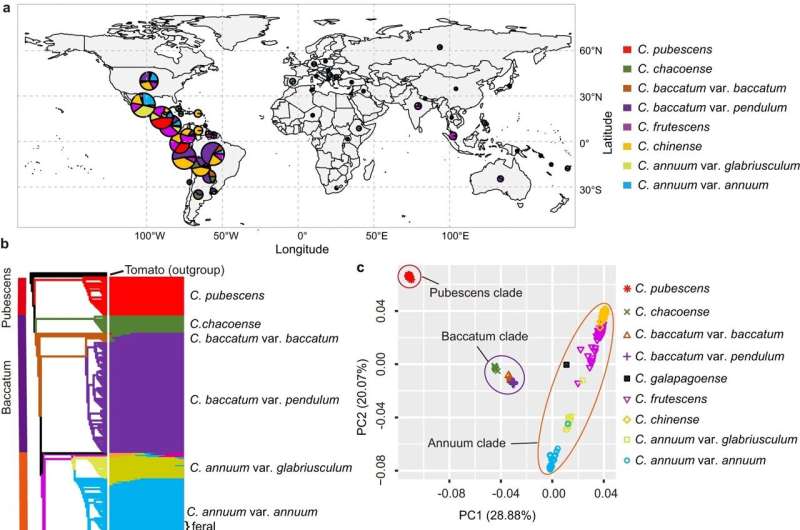This article has been reviewed according to Science X's and . have highlighted the following attributes while ensuring the content's credibility:
fact-checked
peer-reviewed publication
trusted source
proofread
Unlocking the genetic code of peppers: New study reveals insights into domestication and diversity

Peppers are a versatile, flavorful, and widely popular crop, used not only as a healthy food source but also for their medicinal properties.
In a pioneering study recently published in , an international team of researchers, including scientists from the Boyce Thompson Institute, has sequenced the genomes of key cultivated and wild pepper species, offering unprecedented insights into pepper evolution, domestication, and genetic diversity.
"Our analyses have allowed us to identify genes associated with critical traits, including fruit shape, flavor, and stress responses. This opens up a world of possibilities for agricultural advancements and the development of more resilient, flavorful varieties," said Professor Zhangjun Fei, one of the study's lead authors.
The Capsicum genus, commonly called pepper or paprika, belongs to the nightshade family and includes about 35 species. The researchers discovered that the two main domesticated species have been selectively bred in different ways, affecting traits like fruit size, shape, and spiciness. They also found that some species have borrowed genetic traits from others, which could help them better resist pests and environmental stress.
"Our findings suggest that the pepper's domestication is more complex than previously thought," said Fei. "The unique genomic regions we've identified could be significant in developing pepper varieties tailored for specific environmental conditions and those with enhanced fruit quality."
The researchers began by assembling high-quality genomes for three pepper species using advanced sequencing technologies. They constructed a comprehensive graph pan-genome using these genomes as a basis. The team then resequenced the genomes of 500 pepper varieties, covering all five domesticated species and their wild relatives. Using these extensive data, they created a detailed variation map to analyze the genetic differences between these species.
"Our study provides valuable genomic resources that deepen our understanding of pepper genetics, facilitating future functional studies and greatly enhancing breeding efforts," concluded Fei.
The resulting can be searched, viewed, and analyzed and is maintained by the Fei Lab.
More information: Feng Liu et al, Genomes of cultivated and wild Capsicum species provide insights into pepper domestication and population differentiation, Nature Communications (2023).
Journal information: Nature Communications
Provided by Boyce Thompson Institute




















